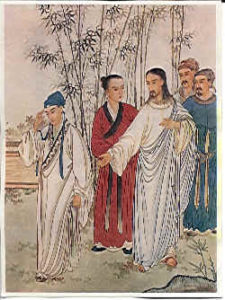There is a story about a rich young ruler in Scripture. While he was at the top of his game, attaining wealth and power as a young man, he felt something was amiss. He heard about Jesus – a young man like himself, not known for wealth but for his wisdom and popularity with the common folk. He went to see him and asked the question,
“Teacher, what good thing must I do to receive eternal life?”
He knew at the end of the day all the money and power in the world would mean nothing if he was dead. He was hoping that by doing this one good thing he’d be set for life and thereafter.
“Why do you ask me about what is good?” Jesus answered with a question and then continued, “Keep the commandments, then you will have life eternal.”
“Which ones?” the rich young ruler asked eagerly. Jesus then gave him five of the Ten Commandments, plus the command to “love your neighbor as yourself.”
“I have done these things, with my whole heart I have!” the young man exclaimed, “But what else do I need to do?”
Let’s pause and think for a moment. If I was this rich young ruler, I would probably have walked away relieved, knowing I had done all I could to obtain eternal life. After all, the Master had just confirmed my entrance into Heaven. But for this rich young ruler, it wasn’t enough. He still felt restless, if not frustrated.
“Jesus did not introduce the Law to show the young man how to be saved, but to show him that he needed to be saved.” Warren W. Wiersbe wrote in his Bible commentary. The rich young ruler needed to be saved from a life defined by accomplishments and the size of his fortune.
What Jesus said to him next would surprise the crowd, rock the world, and unsettle many believers and non-believers alike.
“If you want to be perfect, go, sell your possessions and give to the poor, and you will have treasure in heaven. Then come, follow me.”
Stunned and disappointed, the rich young ruler hung his head and left.

This young man did the admirable thing by seeking answers from the Master, but he was exposed as a lover of money.
I am sure Jesus knew about this young man’s obsession with his wealth, but he didn’t judge him. Instead, Jesus confronted him with the radical alternative of selling all he had and giving the money to the poor. This is a very difficult message. It puts us on the spot to examine our own hearts and motives.
In a painful way, I discovered what defined me and gave me significance in my younger years – my career. A respectable corporate title was what I took pride in…until it was taken from me. I was instantly dropped into the pool of full-time motherhood. Even though many people told me it was a noble and charitable profession, not many people knew what was really in my heart.
I felt like a nobody.
After I lost my job, I was confronted with a radical alternative. Around the same time, a friend gave me a book titled Miserly Moms: Living on One Income in a Two-Income Economy. I felt uneasy, even embarrassed. I didn’t want to live a miserly life. The part in the book about making your own cereals almost pushed me over the edge.
God was dealing with my heart. I wrestled with the likelihood that we would never reach our full earning potential. After a period of struggle, I accepted this “radical alternative” and stopped pursuing a job opportunity. I was going to trim our budget and live by faith. The budget I trimmed and by faith, I lived for a total of twelve years and counting. I didn’t make a dime; neither did I make our own cereal.
“Are we rich?” one of our children asked.
“Why do you ask?” I replied with a question, following the example of Jesus.
If they ask the same question one more time, I might tell them to sell the little that they have and give the money away.
